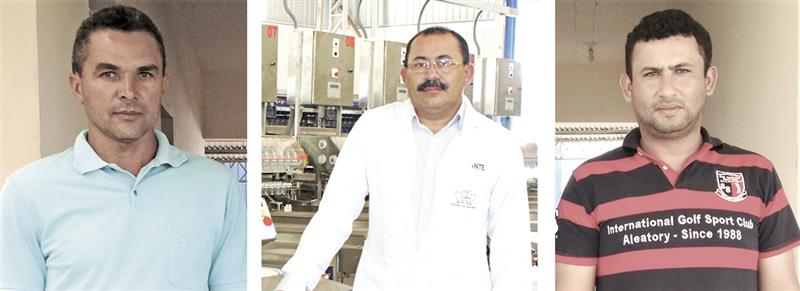Technicians from the South and Northeast of Brazil were trained at the factory
Representatives from farms in Paraná, Alagoas, Sergipe and Bahia were at Yamasa expanding their knowledge about the company`s machines.

Yamasa has always been present in the posture farms of Paraná, in a very prosperous commercial relationship. Currently, the brand expands in Paraná, also, with the YHD line, special for breeding farms and hatcheries. É This is the case of COOPAVEL, Cooperativa Agroindustrial de Cascavel, which purchased a CHS 30,600 machine for one of its hatcheries. To operate and maintain the equipment, technician António Carlos de Oliveira was undergoing training at the Yamasa factory.
Also in Paraná, two egg-laying farms sent employees to Yamasa`s training program. GRANJA MARUTANI, from the traditional producer Gilberto Marutani, from Arapongas, sent its newest technician, the young Everton da Silva Amaral; and COAVE, the Cooperativa Agroindustrial Aviícola Uniao, from Nova Aurora, sent technicians Alan do Prado Barbosa and Clademir Bourscheid for training. Coave’s new machine is an LCHSL 54,000, classifier with washer, automatic tray feeder and seven modern packers. Claudemir has already he had been to the factory, in Rinópolis, in 2014, to meet the new generation of Yamasa graders and, thus, help the Coave board to choose the most suitable model to renovate the cooperative`s egg room .
INCREASINGLY PRESENT IN THE NORTHEAST

In the Brazilian Northeast, Yamasa’s presence is important. bigger and bigger, &agra; as egg production in the region also evolves. In Alagoas, the brand is present in one of the largest farms in the Northeast, LUNA AVÍCOLA, in Arapiraca, owned by producer Luís Eduardo Nunes Filho.
In an accelerated process of modernization, Luna Avi´cola exchanged its old Yamasa machine for a larger piece of equipment, with capacity to process 300 boxes of eggs/hour, with a crack detector and 12 packing machines adapted for styrofoam trays. “This factor was fundamental for us to decide on the purchase”, says Cícero Barros, maintenance manager at Luna Aícola. He was in training at Yamasa in 2014 when the machine was in factory testing. During the training, Cícero Barros was enthusiastic about the evolution that the new machine represents for the farm, which will save money. in manpower and will speed up your the classification of eggs.
In November 2015, two more technicians from the Northeast were undergoing training at the plant in Rinípolis (SP): Dalmo Mota dos Santos, from Sergipe, from GRANJA OVOS SERTANEJOS, from producer Ulices de Andrade Filho, from Our Lady of Lourdes; and Renato Alves dos Santos from Bahia, from GRANJA MULUNGU, owned by Sebastião Freire do Nascimento Júnior.
Dalmo Mota dos Santos spent five days at the Yamasa factory, learning how to operate the grader, the first on the farm. It has the capacity to classify up to 42 boxes of eggs/hour. “ It is a machine that is easy to work with, practical. É It is very good”, praises Dalmo, stating that the automated classification has raised the standard of packed eggs, in addition to speeding up work in the egg room a lot.
GRANJA MULUNGU, located in Ribeira do Pombal (BA), sent technician Renato Alves dos Santos for training. He learned to operate the new machine purchased by the farm, which replaced an older Yamasa. The new equipment has the capacity to classify 42 boxes of eggs/hour. “It was a very important change for the farm and the training given at Yamasa was fundamental”, says Renato.